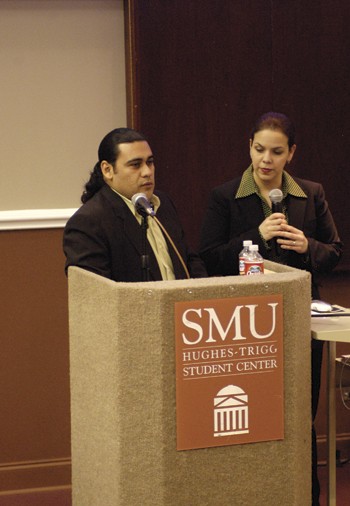
(James Bilowus)
Honduran attorney Mauricio Aguilar spoke Thursday night to a group of SMU students and staff about justice, the poor and the murder of his colleague, lawyer Dionisio Diaz Garcia. Aguilar is in Dallas promoting awareness of the human rights challenges in his country. The lecture was sponsored by Journalists for Human Rights and Amnesty International.
Aguilar is co-coordinator of the Association for a More Just Society in Honduras. The organization opens legal clinics in towns where it offers free legal advice for land rights victims and victims of violent crimes.
Lawyers within AJS work side by side with journalists to tell stories of the difficulties regarding human rights in Honduras.
“The journalists give a human face to these stories,” said Aguilar’s translator Enid Reyes Harvey.
AJS’s main purpose is to identify vulnerable groups and provide them with access to the justice system, said Aguilar.
On Dec. 4, 2006, Aguilar was working undercover for AJS when he received a phone call alerting him that another lawyer in the firm had been murdered. Dionisio Diaz Garcia was gunned down in front of a Honduran courthouse as he was getting out of his car. Two gang members are suspected of murdering Garcia, but the government refuses to help AJS track them down and prosecute them.
Garcia was investigating corruption problems affecting poor workers. Aguilar spoke of private “security companies” exploiting human rights and benefiting from contracts with the government.
“Organized crime is empowered by government in our cities,” said Aguilar.
AJS works with private investigators to obtain documented proof of these crimes.
Aguilar said that Garcia’s death was a message from the government to the people of Honduras – letting them know they have the power and whoever chose to join AJS should expect the same treatment.
Prior to Garcia’s death there were threats made toward the organization, and its members (lawyers and journalists) were followed and assaulted.
The murder “marked a critical moment in our organization,” said Aguilar. The group made the tough decision that day to halt its programs. A team of AJS reporters immediately held a press conference where they publicly named the corrupted security companies working with the government.
From that point on, the organization delegated responsibility to Aguilar and he became the face of AJS.
“Everything we did from that point on involved demanding justice for our colleague,” said Aguilar.
Despite his efforts, threats against AJS continue and the judicial system has blocked all access to documents claiming they are “closed or lost.”
AJS went to the minister of security and asked for his help in obtaining governmental documents, but the organization was told to stop what it was doing.
“Our projects are in crisis,” said Aguilar who is here looking for help from neighboring countries. He hopes to gain allies outside Honduras who will put pressure on the Honduran government.
The organization is currently spending thousands of dollars protecting its members. AJS currently survives on donations from people in countries worldwide, including the United States. Aguilar says the best way to help the organization is to spread the word. He urges people to talk about the human rights challenges Honduras faces with friends, family and politicians. People can help just by creating an awareness of the injustices taking place in Honduras.
Sophomore and student coordinator for JHR Kristin Schutz thought the lecture did a good job of shining light on a desperate situation.
“It’s important to bring focus to Central America because it doesn’t get enough attention, especially in the wake of the Middle East and all that’s going on there,” said Schutz.








